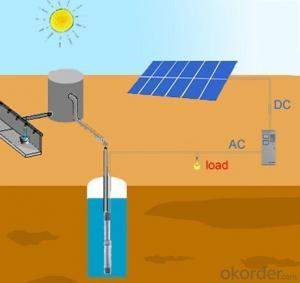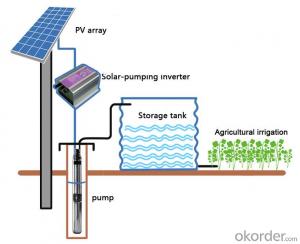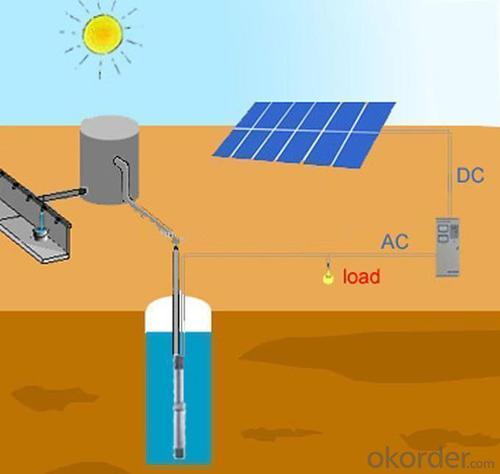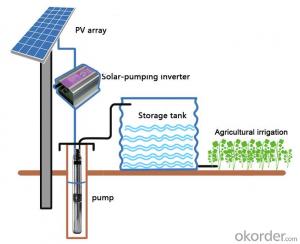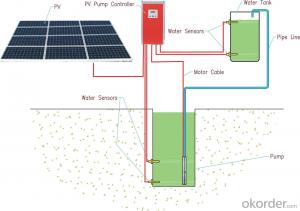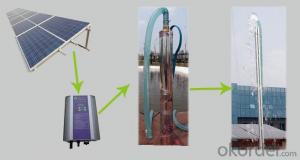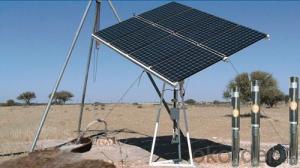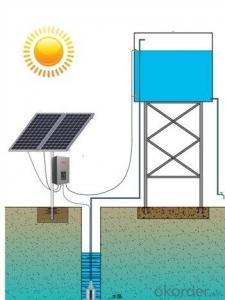Solar Powered Pond Pump Solar Water Pumps
- Loading Port:
- Shanghai
- Payment Terms:
- TT OR LC
- Min Order Qty:
- 1 set
- Supply Capability:
- 1000 set/month
OKorder Service Pledge
OKorder Financial Service
You Might Also Like
Solar Water Pump
DC solar water pumping system consists of the motor, pump, controller, solar array and some other accessories, such as water level sensor, float switch, etc. Considered that storing water is more efficient than storing electricity, the system is designed to directly drive the pump without battery which can reduce the construction and operating cost and routine maintenance effectively.The PV array consists of multiple solar panels connected in series/parallel, which can supply the whole system as power source by converting the absorbed solar radiation energy to the electrical energy. The pump driven by a brushless DC permanent magnet motor draws water from deep-well or river. The pumped water is then fed into reservoir or water tank, or connected to the irrigation system or fountain system directly.
Advanced Technology
Applications Innovation
The efficiency of DC brushless permanent magnet motor has been increased up to 25% in comparison with traditional asynchronous motor.
Technology Innovation
Stator and rotor are sealed by environment friendly casting resin.Motor insulation resistance can be hold higher than 300MΩfor more than 10 years, which consumedly increased the security and reliability of the submersible motor.
Structure Innovation
Casting resign technology processed stator and rotor as well as the water lubricated bearing make the submersible pump environment friendly.
Feature
High Efficiency & High Reliability
DC Brushless Permanent Magnet Motor
Minimum Maintenance, long Service Life
Environment Friendly Materials, Lubricated Without Oil
Application
Village or Family Water Supply
Animal Drinking Water & Livestock Watering
Garden/Courtyard Irrigation
Swimming Pool
Water Supply for Bivouac or Camping Car
Water Supply for Remote Area
Automatic Control
Operate Automatically, No Need Watching
Maximum Power Point Tracking (MPPT)
Dry-run Protection
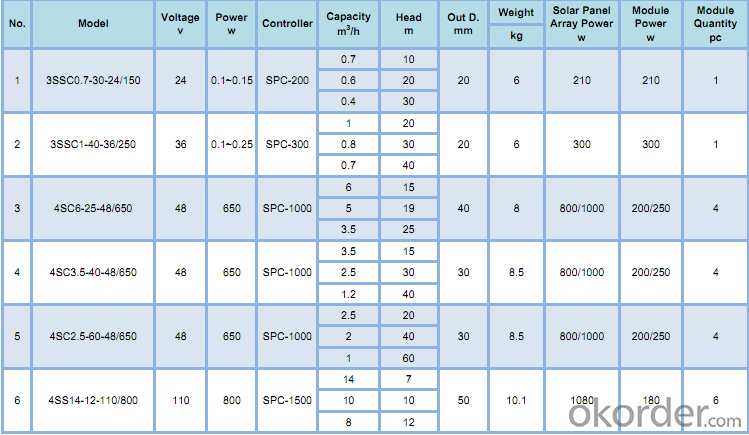
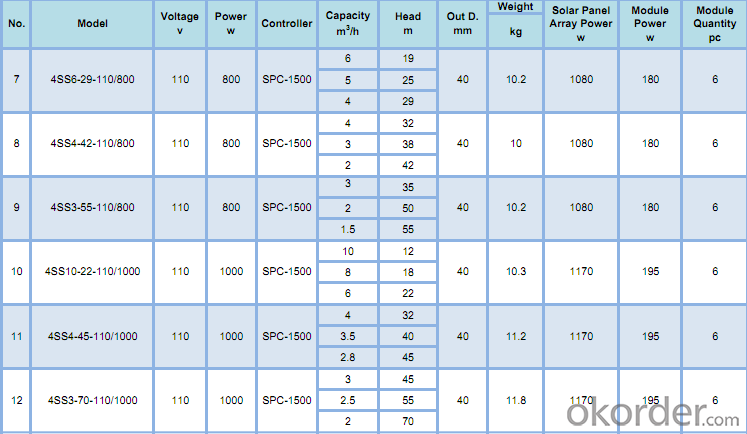
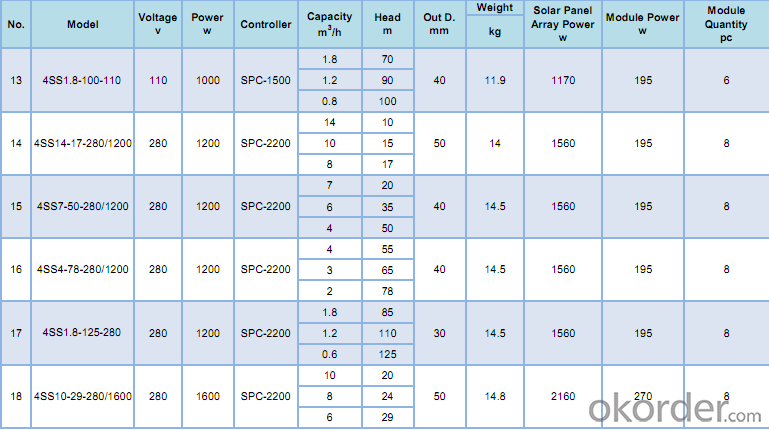
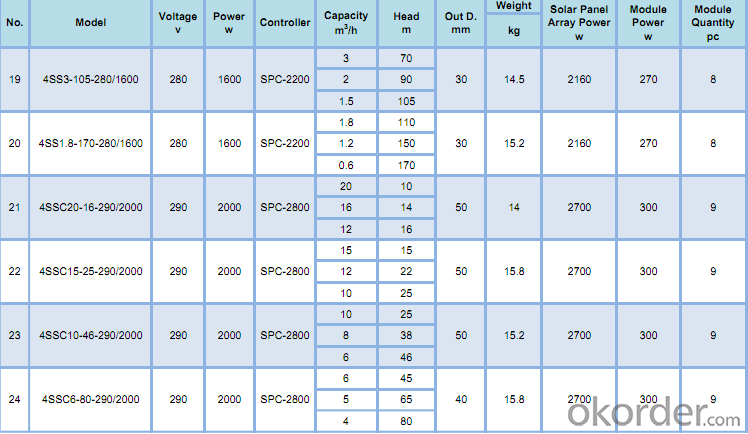
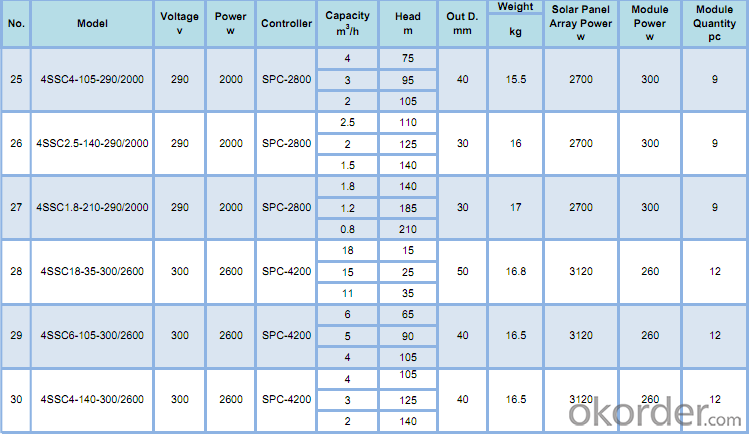
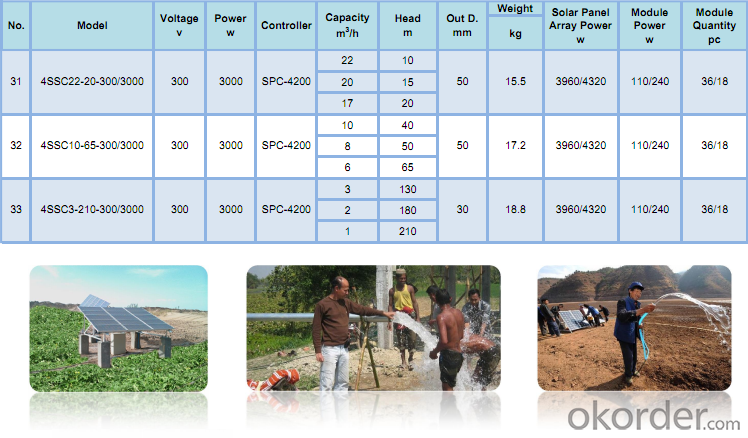
- Q: Are there any limitations to the duration of continuous operation for a solar pump?
- The duration of continuous operation for a solar pump is constrained by several factors. The primary limitation is the availability of sunlight, as solar pumps rely on solar panels to convert sunlight into electricity. Consequently, the pump can only function when there is enough sunlight to generate the necessary power. Moreover, the duration of continuous operation is influenced by the capacity and efficiency of the solar panels. If the panels have low capacity or are ineffective at converting sunlight into electricity, the pump may struggle to operate for extended periods. Additionally, the size and capacity of the pump itself can impose restrictions on continuous operation. If the pump is not designed to handle prolonged use, it may overheat or experience mechanical failures. Furthermore, weather conditions can impact the duration of continuous operation. Cloudy or rainy days can significantly reduce the amount of available sunlight, thereby limiting the pump's functionality. To address these limitations, some solar pump systems incorporate battery storage. These batteries can store excess energy generated during sunny periods, enabling the pump to operate during periods of low sunlight or at night. However, the duration of continuous operation still hinges on the battery capacity and the amount of stored energy. In conclusion, the limitations to the duration of continuous operation for a solar pump are primarily determined by the availability of sunlight, the capacity and efficiency of the solar panels, the size and capacity of the pump, and the presence of battery storage.
- Q: What is the maximum depth a solar pump can reach?
- The maximum depth a solar pump can reach depends on various factors such as the power of the solar panels, the efficiency of the pump, and the quality of the water source. However, on average, solar pumps can typically reach depths of up to 100-200 feet.
- Q: Can a solar pump be used for industrial purposes?
- Yes, a solar pump can indeed be used for industrial purposes. Solar pumps are increasingly being utilized in various industrial applications such as agriculture, water supply, irrigation, and wastewater management. They offer a sustainable and cost-effective solution by harnessing solar energy to power the pump, reducing the reliance on traditional energy sources. Moreover, solar pumps are often more reliable, require less maintenance, and have a longer lifespan compared to conventional pumps, making them a viable choice for industrial use.
- Q: How much water can a solar pump deliver in a day?
- The amount of water that a solar pump can deliver in a day depends on various factors such as the size and capacity of the pump, the amount of sunlight available, and the specific requirements of the water system it is connected to. Generally, solar pumps are designed to operate efficiently in areas with abundant sunlight. A small solar pump with a capacity of 1,000 liters per hour, for example, can deliver approximately 24,000 liters of water in a day if it operates at its maximum capacity for 24 hours. However, it is important to consider that solar pumps typically work during daylight hours when the sun is shining. They may not operate at full capacity during cloudy or overcast days, leading to a reduction in the daily water delivery. Additionally, larger solar pumps with higher capacity can deliver significantly more water in a day compared to smaller ones. To determine the specific amount of water that a solar pump can deliver in a day, it is recommended to consult the manufacturer's specifications and consider the local weather conditions and requirements of the water system.
- Q: On the issue of pumps and solar panels
- To the battery pack, and by the battery to the inverter circuit to provide a stable voltage and current, if your pump motor is a single phase 100W, then the inverter power at least greater than the value of 1 times to 1.5 times Caixing,
- Q: How does a solar pump handle water source contamination from industrial waste?
- A solar pump does not directly handle water source contamination from industrial waste. However, it can be used in conjunction with other water treatment systems to mitigate the effects of contamination. The contaminated water can be pumped into a treatment system where it undergoes various processes like filtration, disinfection, and chemical treatment to remove or neutralize pollutants before being utilized or discharged safely.
- Q: Can a solar pump be used in areas with limited access to water level indicators?
- Yes, a solar pump can still be used in areas with limited access to water level indicators. While water level indicators can be useful for monitoring and managing water usage, a solar pump can still operate in these areas without relying on such indicators. Solar pumps are designed to utilize solar energy to pump water from a source, such as a well or a body of water. As long as there is a water source available, a solar pump can be installed and used to provide water, even in areas without water level indicators.
- Q: What is the maximum water depth that a solar pump can reach?
- The maximum water depth that a solar pump can reach varies depending on the specific model and its specifications. However, on average, solar pumps are capable of pumping water from depths of up to 100 to 200 feet (30 to 60 meters).
- Q: Are there any safety concerns with installing and operating a solar pump?
- Installing and operating a solar pump comes with several safety considerations. Firstly, the installation process carries the risk of electric shock if proper precautions are not taken. It is crucial to correctly and securely make electrical connections and ensure the system is grounded to prevent electrical hazards. Additionally, working at heights during installation can lead to falls or accidents if not done safely. Secondly, safety concerns arise during maintenance and operation. Regular inspection and maintenance are necessary to keep the system running smoothly. This may involve working with electrical components or being exposed to moving parts, which can be potentially dangerous without following proper safety measures. Furthermore, depending on the location and design of the solar pump system, there may be risks associated with the water supply. Contaminated water sources or improper sealing of the pump can lead to waterborne diseases or other health hazards. To address these safety concerns, it is advisable to hire a professional and experienced installer who can ensure correct and safe installation. Regular maintenance and inspection should be conducted to identify and address any potential issues. Following the manufacturer's guidelines and recommendations for safe operation and using appropriate personal protective equipment when working with or around the solar pump system are also essential.
- Q: What is the average cost of a solar pump installation?
- The average cost of a solar pump installation can vary depending on various factors such as the size and capacity of the pump, the location, and any additional components or accessories required. However, on average, a solar pump installation can range from $2,000 to $10,000 or more. It is advisable to consult with a professional installer or obtain quotes from multiple suppliers to get an accurate estimate for your specific needs.
Send your message to us
Solar Powered Pond Pump Solar Water Pumps
- Loading Port:
- Shanghai
- Payment Terms:
- TT OR LC
- Min Order Qty:
- 1 set
- Supply Capability:
- 1000 set/month
OKorder Service Pledge
OKorder Financial Service
Similar products
Hot products
Hot Searches
Related keywords
